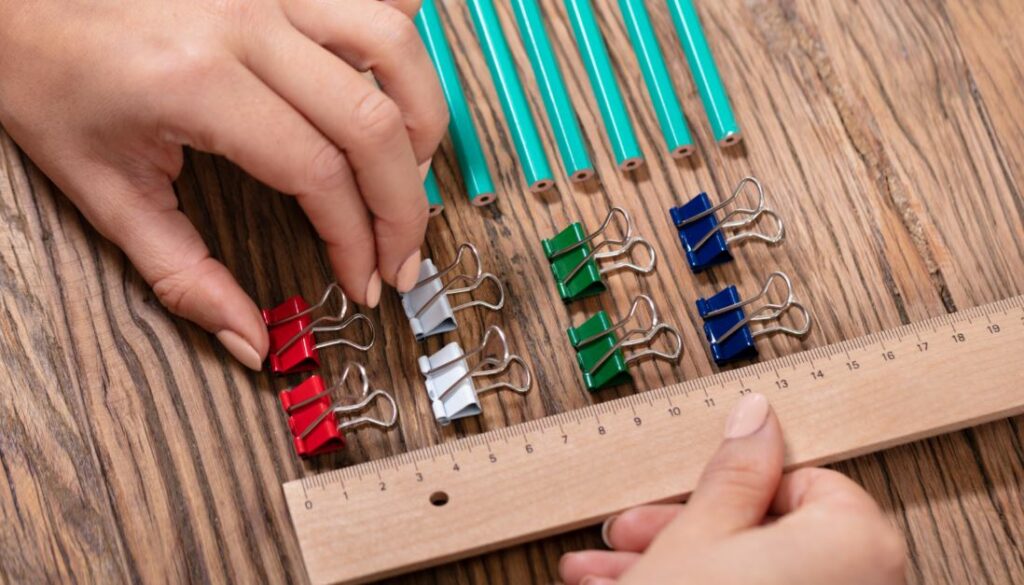
Symptoms of ADHD can be effectively treated, but learning healthy coping mechanisms is a big part of trying to live with ADHD while improving wellbeing. It can cause procrastination, difficulty concentrating, impulsive behavior, and more.
While it can take some time to properly utilize coping methods and some may work better for you than others, it is possible to develop strategies that can help. This article examines some things that you can do to improve symptoms, learn to manage feelings, and strive toward better mental health and wellbeing.
How to Stay Organized with ADHD
Staying organized with ADHD can be a challenge and just thinking about organization and structure may cause you to feel stressed, but if you can break down the organization into manageable tasks you may find that it gives you an advantage and helps you tackle those overwhelmed feelings.
Creating easy ways to organize can make it much easier. For example, keeping designated areas for your supplies that make them easy to put back or retrieve when needed can make it much easier to stay organized instead of disregarding organization as soon as your day is complete.
Building a daily routine can also go a long way toward better organization in your life. While it takes time to build that type of structure, keeping calendar alarms on your phone can help you wake up, go to sleep, take breaks, leave for work, and complete chores at the same time every day so that you continue to do so until it becomes a habit. This can keep you on track and ward off procrastination.
How to Manage Time with ADHD
You don’t have to have ADHD to lose track of time, procrastinate, miss deadlines, or take unreasonable amounts of time for simple tasks, but it does make those things more likely. Time management is a valuable skill, but it does not always come naturally.
Keep a clock by your desk or any other location where you often get focused on a certain task, hobby, or other experience. This will help you notice how much time you are actually spending, which can help put you back on track before you use up your entire day. You may even find that setting a timer for certain tasks helps a lot as well.
Another time management issue is the inability to correctly prioritize the things that you must do each day and week. With anything, it is best to decide what you need to finish first and what things can wait until later in the day or week. Then, you may also find it helpful to break larger projects into smaller components that are easier to tackle without feeling overwhelmed.
How to Stay Focused with ADHD
ADHD can make it hard to concentrate on things that you need to complete. This is a problem that can be related to organization and time management as well as impulse control. Try not to take on too much work and learn to say no when you are too busy to take on more. If we have too much to do, then it is harder to focus on one of those things at a time because our mind naturally drifts toward the other things we need to complete.
While it can be hard to completely eliminate distractions, taking the necessary steps to limit distractions can go a long way toward better focus and attention. Tell your coworkers that you cannot be bothered at certain times or when you are at your desk.
If you work at home, try to limit distractions from family members or pets by creating a distinct work area away from others. You should also turn off your phone and any other notifications that can distract or take your mind off of the task at hand.
Finally, take breaks regularly throughout the day. Nobody should work non-stop for 7 to 10 hours every day and doing so can hurt productivity more than the time away during breaks. During a break, it can be helpful to snack on something healthy, take a walk, or socialize.
Anything that makes you feel positive or relaxed can be beneficial. Just be wary of sugar, naps, and other things that may cause fatigue and drowsiness later on.
How to Manage Stress with ADHD
Stress can be detrimental to wellbeing and can also impact your sleep schedule, eating habits, and enjoyment of pleasurable activities. Then, not taking care of yourself can add to the stress. To avoid this, even when you are extremely stressed, focus on taking care of yourself, eating right, and getting enough sleep.
Spending time outside and getting exercise can go a long way toward alleviating symptoms associated with high-stress levels. If you don’t find the idea of going to the gym appealing, then you can try other forms of exercise that you enjoy more like taking walks, dancing, or joining a sports club.
You can also try mindfulness techniques to help relieve stress and anxiety. Mindfulness meditation can be highly beneficial and allow you to improve focus and control habits.
Even if you have never done it before or don’t have much time to give toward meditating, as long as you can commit at least 5 to 10 minutes each day for meditation you may find that it helps significantly with your symptoms of ADHD and reduces symptoms of worsened stress.
To get started with mindfulness mediation, find a time and place where there are no distractions and where you can give the time without worrying about the next thing you have to do. Close your eyes softly and sit up straight while breathing normally. Concentrate on breathing and be aware of the air going in and out as you inhale and exhale.
Do not attempt to stop thinking completely. Instead, watch thoughts as they enter and exit your mind without judging them or following them. If you find that you are following a train of thought, refocus on your breathing.
Do this every day and you will become more aware and relaxed normally, which can be highly beneficial for those with ADHD as well as anybody struggling with stress.
Conclusion
ADHD can make it hard to function in the ways that you would like, but there are certainly ways to manage the symptoms. While medication and therapy can be helpful treatment options, there are also plenty of coping mechanisms that you can use yourself to alleviate symptoms and stay better organized, focused, and productive.
About the author

With an interest and dedication to addressing stigmas associated with mental health, she continues to specifically target subjects related to anxiety and depression.








